Pasteurization and Food Safety: The Benefits of Pasteurization

In the food processing and preservation industry, pasteurization stands as a fundamental pillar for ensuring food safety. As we dive into the benefits of pasteurization, let's explore how this heat treatment process, performed by advanced pasteurisers like SAROM GLOBAL's HERMES series, plays a vital role in maintaining the quality and safety of our food supply. Understanding Pasteurization and Its Significance Pasteurization is a heat treatment technique designed to eliminate harmful pathogens and extend the shelf life of various consumable products, particularly dairy items like milk. This process is pivotal for food safety, as it neutralises harmful microorganisms without compromising the nutritional value or taste of the product. Enhancing Food Safety Through Heat Treatment Milk pasteurization, for instance, involves subjecting the liquid to a precise temperature for a specific duration. This mild heat effectively eliminates pathogens, such as harmful bacteria and parasit



